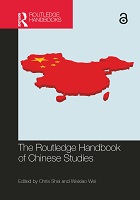Chapter 35 In the name of stability
Proposal review
Literary censorship and self-censorship in contemporary China
| dc.contributor.author | Hladíková, Kamila | |
| dc.date.accessioned | 2022-12-12T13:44:07Z | |
| dc.date.available | 2022-12-12T13:44:07Z | |
| dc.date.issued | 2021 | |
| dc.identifier.uri | https://library.oapen.org/handle/20.500.12657/60122 | |
| dc.description.abstract | Scrutinizing Chinese literary field from the perspective of new censorship theories (Burt, 1994; Holquist, 1994; Post, 1998; Butler, 1998), this chapter describes mechanisms and provides deeper insights into ideological objectives of contemporary Chinese censorship, which can be summed up by notions of maintaining stability (维稳) and social harmony (社会和谐). Within the frame of Hockx’s (1999) adaptation of Bordieu’s (1992) concept of literary field for modern Chinese literature, the present study highlights nodal points of continuity in the official standpoints and requirements on literature and arts despite turbulent changes in both politics and society in the PRC during the last 70 years. It stresses the persisting importance of ‘political capital’ that Hockx linked to ‘[writers’] ability to deal with the concept of people.’ The original Party slogan to ‘serve the people,’ repeatedly emphasized by present president Xi Jinping, still applies to each segment of the Chinese literary field, from writers through editors to publishers and sellers, as the prominent writer Yan Lianke (2016) has pointed out by describing the major shift from ‘hard censorship’ to a ‘soft’ one, which requires ‘self-monitoring’ motivated by ‘the seduction of power, fame and influence rather than being a product of fear and desperation.’ This shift marks a notable transformation of the original notion of literature and arts as the main tools of propaganda formulated by Mao in Yan’an in 1942. The centralized, state-controlled literary establishment was gradually abolished during the post-Mao era, nevertheless, the basic principles in the official Party discourse remain and literature should still to some extent serve to extraliterary objectives. The persisting tension between writers’ (critical) commitment to ‘reality’ and the officially formulated aims of literary creation propelled by collision between the symbolic and the political capitals, has been since the 1990s diluted by growing potential of the economic capital and massive influence of popular culture that has (once again) become a targeted tool for promoting the official ideology and its master narratives. Nevertheless, as this chapter argues, the official literary system has successfully adapted to the new conditions and maintained effective control over the literary field in China. | en_US |
| dc.language | English | en_US |
| dc.subject.classification | thema EDItEUR::C Language and Linguistics::CJ Language teaching and learning | en_US |
| dc.subject.other | Chinese; identity; research; political system; governance, international relations; sociology; culture | en_US |
| dc.title | Chapter 35 In the name of stability | en_US |
| dc.title.alternative | Literary censorship and self-censorship in contemporary China | en_US |
| dc.type | chapter | |
| oapen.identifier.doi | 10.4324/9780429059704-41 | en_US |
| oapen.relation.isPublishedBy | 7b3c7b10-5b1e-40b3-860e-c6dd5197f0bb | en_US |
| oapen.relation.isPartOfBook | f7278a4a-c700-45a8-96b4-6ab326a91d8f | en_US |
| oapen.relation.isbn | 9780367181390 | en_US |
| oapen.relation.isbn | 9780367760908 | en_US |
| oapen.imprint | Routledge | en_US |
| oapen.pages | 14 | en_US |
| oapen.remark.public | Funder name: Sinophone Borderlands: Interaction at the Edges, reg. no. CZ.02.1.01/0.0/0.0/16_019/0000791 | |
| peerreview.anonymity | Single-anonymised | |
| peerreview.id | bc80075c-96cc-4740-a9f3-a234bc2598f1 | |
| peerreview.open.review | No | |
| peerreview.publish.responsibility | Publisher | |
| peerreview.review.stage | Pre-publication | |
| peerreview.review.type | Proposal | |
| peerreview.reviewer.type | Internal editor | |
| peerreview.reviewer.type | External peer reviewer | |
| peerreview.title | Proposal review | |
| oapen.review.comments | Taylor & Francis open access titles are reviewed as a minimum at proposal stage by at least two external peer reviewers and an internal editor (additional reviews may be sought and additional content reviewed as required). |

